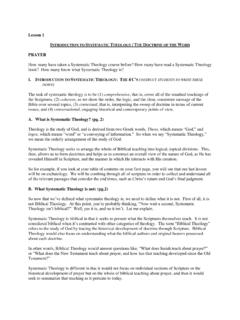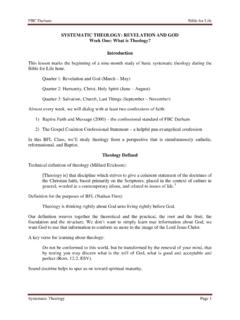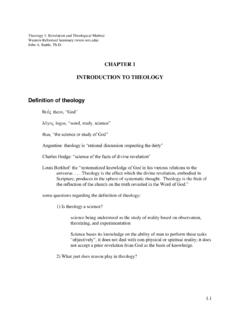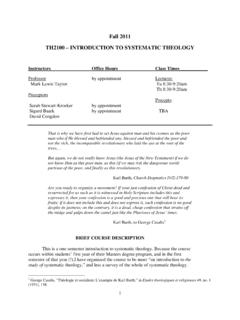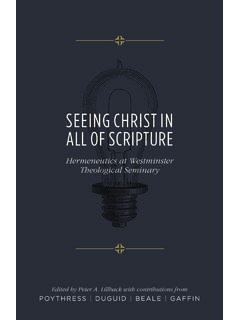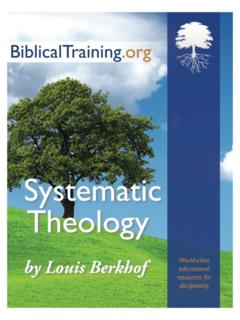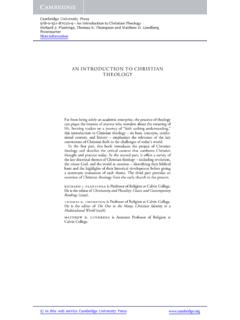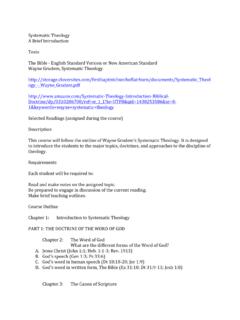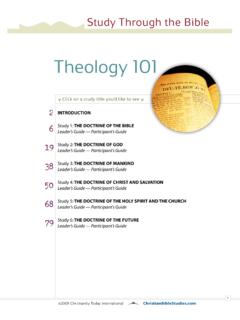Transcription of SYSTEMATIC THEOLOGY DR. E. C. BRAGG A FOUR YEAR …
1 SYSTEMATIC THEOLOGY . DR. E. C. BRAGG . A FOUR YEAR COURSE. GENERAL introduction . SYSTEMATIC THEOLOGY Four Year Separate Subjects Angelology/Demonology - Doctrine of Angels, Satan, and Demons Anthropology - Doctrine of Man Bibliology - Doctrine of the Bible Christology - Doctrine of Christ Cosmology - Doctrine of the Earth Ecclesiology - Doctrine of the Church Eschatology - Doctrine of Biblical Prophecy Harmartiology - Doctrine of Sin Pneumatology - Doctrine of the Holy Spirit Soteriology - Doctrine of Salvation THEOLOGY - Doctrine of God SYSTEMATIC THEOLOGY General introduction We shall not concern ourselves in this course with the intricate distinctions usually made between various kinds of THEOLOGY nor the history of the usage of the term THEOLOGY . Any comprehensive on the subject of SYSTEMATIC THEOLOGY will furnish this data for ready reference without burdening the mind with much that is just as readily forgotten. We might merely name some of the intricate distinctions usually made just to illustrate: 1.
2 There is that of Natural and Revealed, sometimes called, Natural and Supernatural. 2. There is the distinction between the following: a. True and False THEOLOGY b. Theoretical and Practical c. Dogmatic and Moral d. Thetic and Antithetic e. Didactic and Polemic f. Critical and Elenctic g. Subjective and Objective h. Scholastic and Positive The study of Christian Doctrine is the foundation of all Bible study. It forms a firm bedrock for all other Bible study or subjects. It should straighten our loose thinking, strengthen our faith, increase our love of the Word of God, and formulate into one coherent system all of our beliefs so that the Word of God will reveal itself as one grand harmony, the basis for our faith and practice. Many have derided the study of the Doctrine as unnecessary and particularly deadening to religious life, when, in truth, the very opposite is true. A tree is known by its fruit. A good tree, like the SYSTEMATIC study of the Word of God, must only bring forth good fruit.
3 Any constant handling of the Word of God; any deep study in the Word of Life must of necessity strengthen and nourish that new life of God in the soul. Peter says that it is the "sincere milk of the Word,". I Peter 2:2, that causes the growth in our spiritual life. By way of illustration, one may note within any given congregation that the ratio of real meaty Bible exposition is the index of spirituality in the hearers. I have heard several times the boast by a preacher, "I do not have any doctrine in my sermons." How can any man preach the Word of God and not include Doctrine? What a mystery that is! If by doctrine he means great theological definitions and vagaries, I. could give a hearty "Amen," but, we shall see by our definition of what we sincerely believe to be true of SYSTEMATIC THEOLOGY , that a man cannot preach the Word of God and not include Doctrine. Most opposition to the study of Doctrine may be traced to a desire to get away from the restrictions it would pace upon unbridled thinking, or imagination, and license of speculation.
4 As far as Doctrine formulating a creed, every man must have a creed. It may be negative or positive. It may be a creed denying the possession of a creed, but, nevertheless, it is a creed. If it is the soul's belief, whether positive or negative, then it is the man's creed. It is the regulator of his life. Someone has said, "A creed is like a backbone; a man doesn't need to wear his backbone in front of him, but he must have one, and that a correct one." It holds the figure erect and gives shape to the body. Such is the underlying purpose of the study of Doctrine. I. Definition of Biblical Doctrine Christian Doctrine is the aggregation of all that the Bible has to say upon any one subject. II Peter 1:20-21, (Rotherham translation), "Of this first taking note that no prophecy of Scripture becomes self-solving; for not by will of man was prophecy brought in any time;. but, as by the Holy Spirit, they were borne along spoken by man.". It is stated thusly in John Nelson Darby's translation, "Knowing this (first principle) that the scope of no prophecy of Scripture is had from its own particular interpretation, for prophecy was not even uttered by the will of man, but holy men of God spoke under the power of the Holy Spirit.
5 ". This is the principle of truth in the Word of God, that nowhere in any one place does the Holy Spirit give a complete outline of any particular truth. Since there is only one Author of the Bible, though many writers, however, God could give to whomsoever He willed a little more of the particular doctrine until, through the centuries, the teaching is complete. Throughout the whole Bible, therefore, many times quite removed from each other, various writers, under different circumstances, by varying names, the Holy Spirit moved or carried holy men of God along to add here and there different facets to the diamond of some truth until the finished Doctrine emerges. Here is the need for the study of Doctrine gathering from all the Scriptures everything that is taught on any one subject, systematizing them into one coherent doctrine or SYSTEMATIC THEOLOGY . Also, there is a consideration of the errors taught as Bible doctrine with a refutation. II. Some Distinctions There must be kept in mind the difference between the study of Doctrine and experience; one does not want to build a doctrine on personal experiences, but only upon the infallible Word of God.
6 A. Morality is a law; Christianity is a life. Morality is conforming to an abstract law of right, while Christianity is a relationship in communion with God. We judge a man's THEOLOGY by his creed, but his Christianity by his life. THEOLOGY is of the head; Christianity is of the heart. The prime danger in the study of THEOLOGY , as in all Bible study, is the advancement of the head while the heart stands still and is barren. The words of Jesus still resound, "If ye know these things, happy are ye if ye do them," John 13:17; also, "Except your righteousness exceed the righteousness of the Scribes and Pharisees, ye shall in no wise enter the kingdom of heaven," Matthew 5:20. They had morality, human righteousness, but no real relationship with God. The Scribes knew the Law of God forwards and backwards, the latter more than the former, but they did not know the God of the law. B. THEOLOGY is a creed; Christianity is a life. A man may be a theologian and yet not a Christian.
7 He may know something about God and yet not know God. Many a man who knew nothing of the five points of Calvin, or the thirty-nine articles of Martin Luther, may yet be in heaven, while another well versed in the Westminster Catechism, and well-schooled in THEOLOGY , may find himself in eternity without Christ; damned in spite of his THEOLOGY . Sam Jones well said, "I'd rather know my 's in heaven than Greek and Hebrew in hell. C. Worship is an art; Christianity is a life. Worship is but the outward expression of the God-given instinct to reverence of the Supreme Being. A pagan worships, but according to God's Word, "The things that the heathen sacrifice, they sacrifice not unto God but unto demons," I Corinthians 10:20. It is further seen in Scripture that their sacrifices are "an abomination unto God," Proverbs 15:8, 21:27; and "even his prayer shall be an abomination,". Proverbs 28:9. A man may worship, Paul states, "whom therefore ye ignorantly worship, him declare I unto you," Acts 17:22-23.
8 The Christian worship is "in the Spirit, for the Father seeketh such to worship Him," John 4:23, for His Spirit has been made alive by God's Holy Spirit and now has a worshipping communion. III. Two True Sources of Doctrine A. Nature This source is very limited. In the study of Christian Apologetics we see that it only shows forth "His eternal power and Godhead" as Paul says in Romans 1:20; see also Psalm 19. The inadequacy of nature as a source of Doctrine may be seen from Acts 17:23. B. The Scriptures Doctrine must, from the very necessity of the case, be a subject of Divine revelation. "Man by searching cannot find out God. 'Canst thou find out the Almighty unto perfection;'". said by Zophar in Job 11:7 but still true. God must reveal Himself to man. Man lacks the proper faculties, and the ones he has by nature are fallen, depraved, or deformed and give a contorted, distorted picture of God. God must "by bearing along holy men of God by His Holy Spirit," I Peter 1:21, give us through the Scriptures a revelation of Himself.
9 IV. Four Mistaken Sources of Doctrine A. Traditionalism Traditionalism is the accumulation of the ages of certain beliefs of the great men and institutions until they partake of an ascribing of infallibility on a par with the Scriptures, and, in certain pet beliefs, superior to, and superseding the Scriptures. Many times they are contradictory to the Scriptures. One of the classical examples is to be found in the Gospels when Jesus came to His own people and accused them of making void the Word of God by their traditions, as included in their Targums, Talmud and Kabalistic writings. See Matthew 15:2-9. Note verse 9 carefully, "But in vain they do worship me, teaching for doctrines the commandments of men." See the whole context in chapter 15:1-14, "Blind leaders of the blind;" see also Mark 7:13, "making the Word of God" of no effect through your tradition.". The Revised Standard Version uses the word "void." Rotherham uses the word "cancelling.". Thayer states, "of akuroo," or without authority, not binding, void.
10 This, of course, is the whole plan of the enemy of God and His Word, that of Satan, nullifying first the inspiration, the result then is denying the authority of the Bible. If it is but man's book, it only has man's faulty sayings and thus not any better than our own. How many times are the very plain teachings of Scripture set at naught and a diametrically opposing doctrine taught by the substitution of traditions? This can be seen in the teachings of Catholicism with their advocacy of the infallibility of the Pope and the College of Cardinals when they are speaking "ex cathedra," or in "their office.". B. Rationalism This is the source of modernism and Higher Criticism. It would subject all of the teachings of the Bible to the criteria of human reason and reject anything in the Bible that is contrary to their own slant of reasoning. How dangerous that can be is easily seen when we consider how biased toward evil the natural, unconverted man is and how darkened his intellect.
